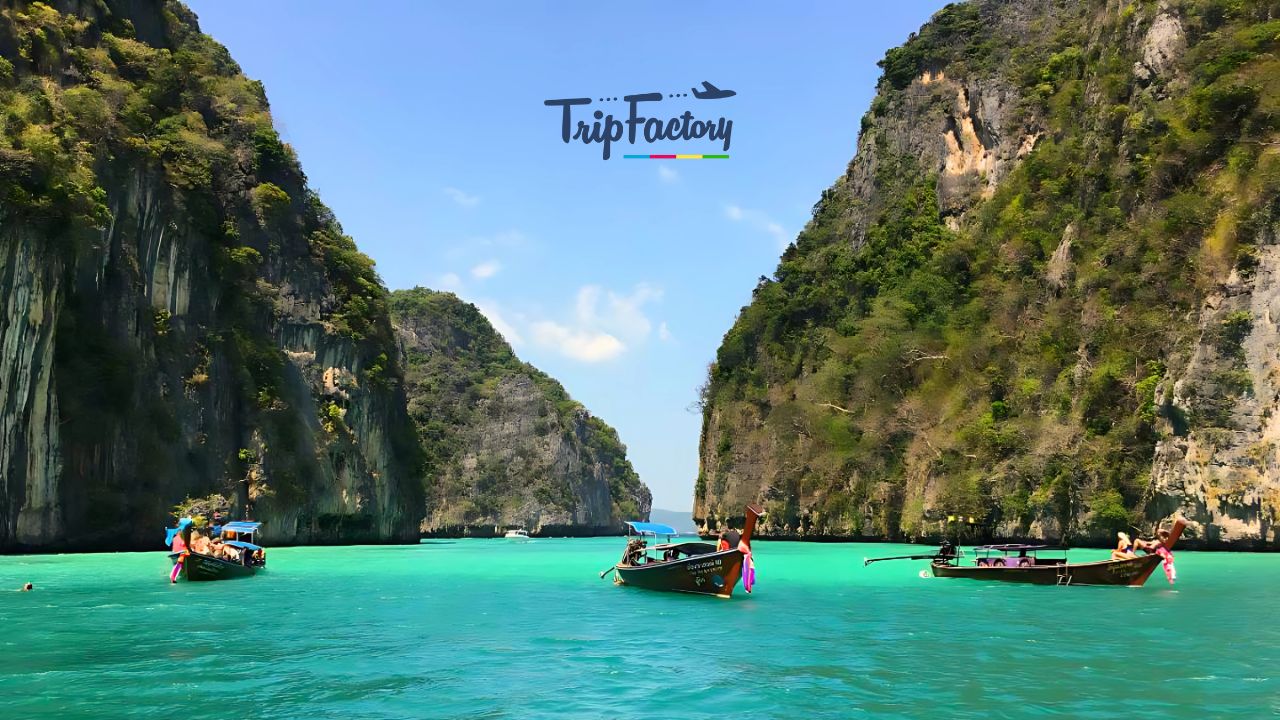Krabi in July offers a wonderful opportunity to explore Thailand’s tropical beauty without the overwhelming crowds. As part of the rainy season, Krabi in July is marked by refreshing rainfall, lush greenery, and cooler temperatures. Whether you’re an adventurer or someone seeking a quiet retreat, Krabi during this time provides a special, off-the-beaten-path experience.
Table of Contents
Krabi Weather in July
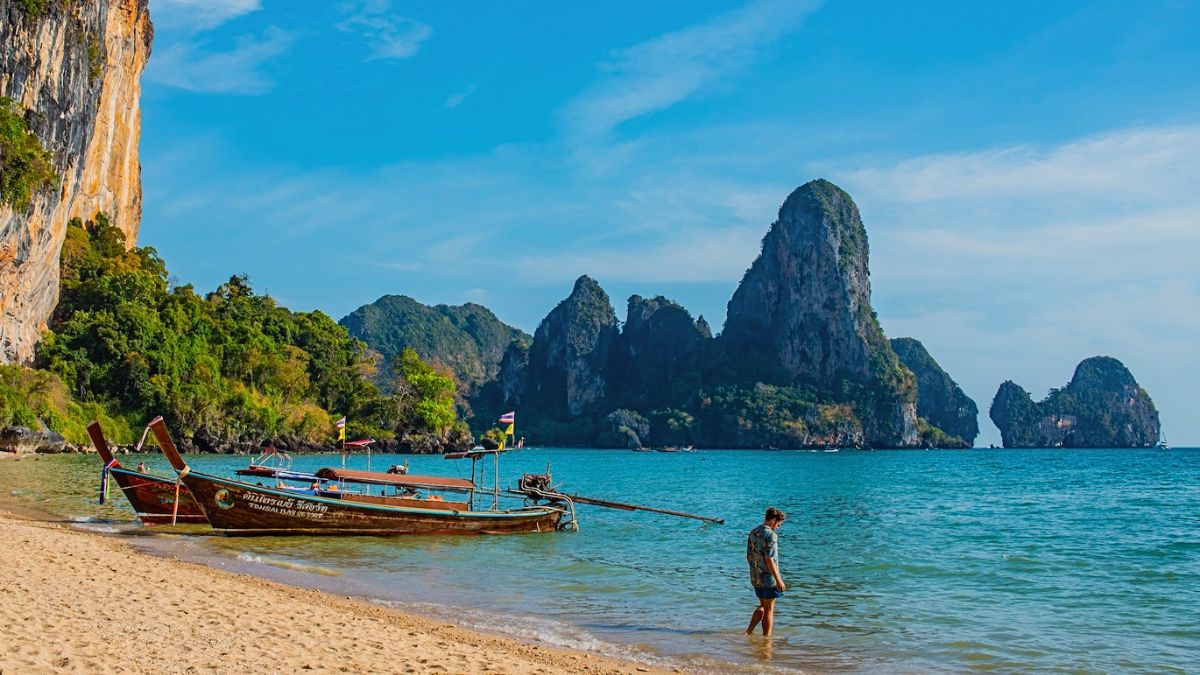
July marks the peak of Krabi’s rainy season, with temperatures typically ranging from 24°C to 31°C (75°F to 88°F). While showers are frequent, they tend to be short and intense, followed by clear skies and warm sunshine. The rainfall nurtures Krabi’s abundant natural beauty, making it a perfect time for those who enjoy lush landscapes, vibrant waterfalls, and a calm atmosphere.
| Aspect | Details |
|---|---|
| Month | July |
| Weather | Peak of Krabi’s rainy season |
| Temperature Range | 24°C to 31°C (75°F to 88°F) |
| Rainfall | Frequent showers, short and intense |
| Post-Rain | Clear skies and warm sunshine after showers |
| Natural Beauty | Lush landscapes, vibrant waterfalls, and abundant natural beauty |
| Atmosphere | Calm and peaceful |
| Best For | Nature lovers, those who enjoy vibrant scenery and lush landscapes |
Why Visit Krabi in July?
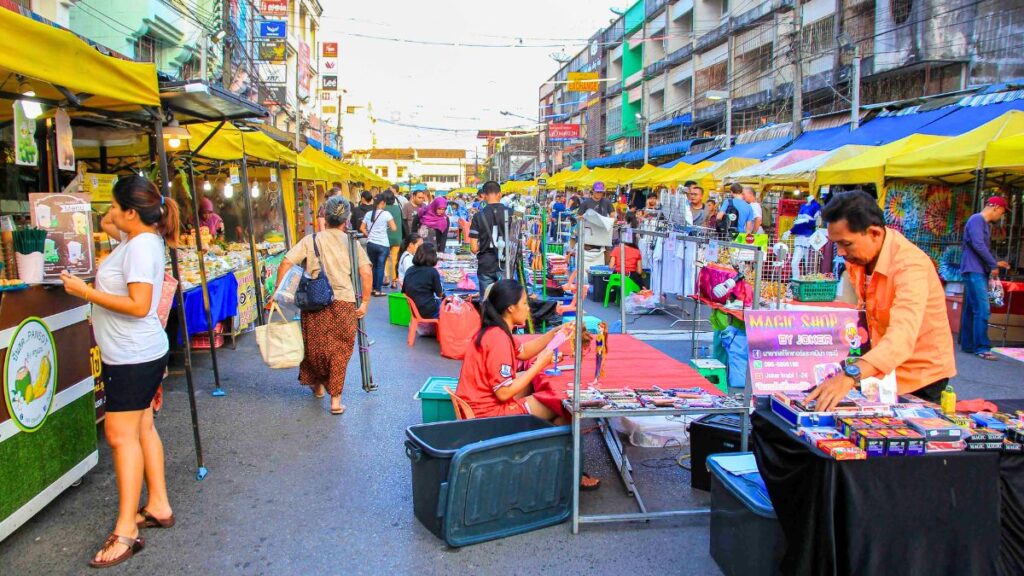
- Fewer Crowds: July is part of Krabi’s low season, meaning fewer tourists and more peace. It’s the ideal time to experience Krabi’s attractions without the crowds.
- Budget-Friendly Travel: Hotels, resorts, and tours often offer discounts, making it a great time for budget-conscious travelers.
- Enhanced Natural Beauty: The rains make Krabi’s landscapes even more beautiful, with greenery in full bloom and waterfalls at their most impressive.
Places to Visit in Krabi in July
Railay Beach and Caves
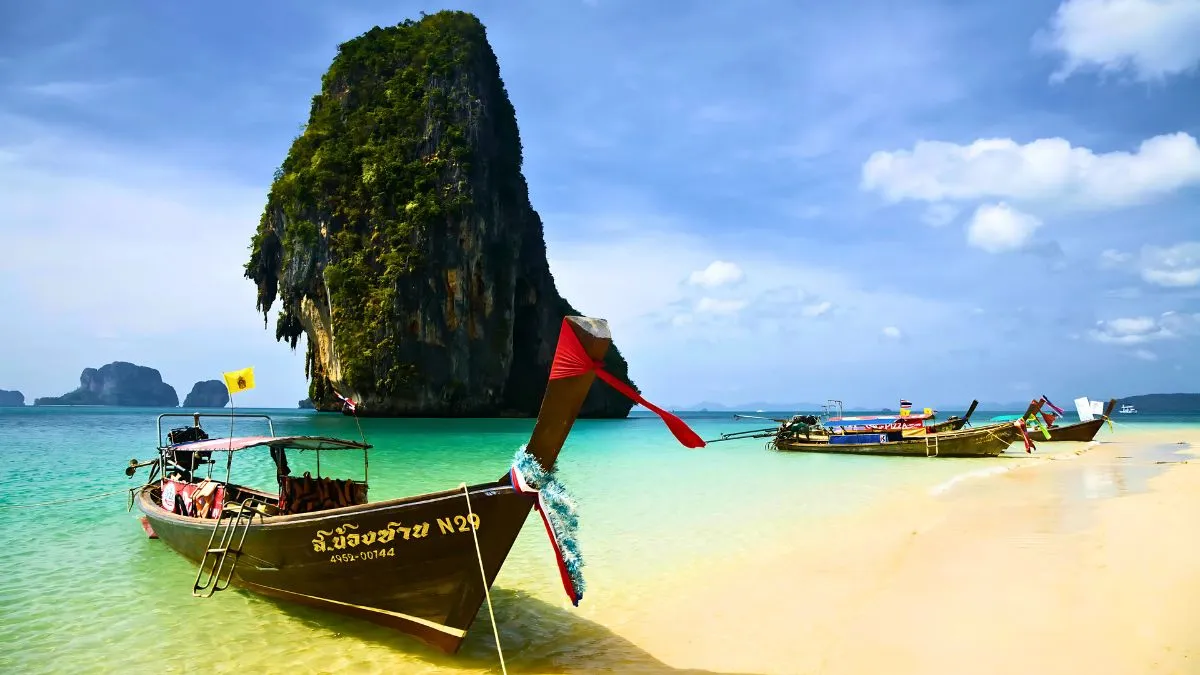
Why Visit? Known for its dramatic limestone cliffs, Railay Beach is a paradise for beach lovers and adventure seekers alike. It’s accessible only by boat, making it a more attractive destination.
Highlights:
- Phra Nang Cave: A sacred site with fascinating stalactites and stalagmites.
- Railay Viewpoint: A rewarding short hike offering panoramic views of the coastline.
Phi Phi Islands
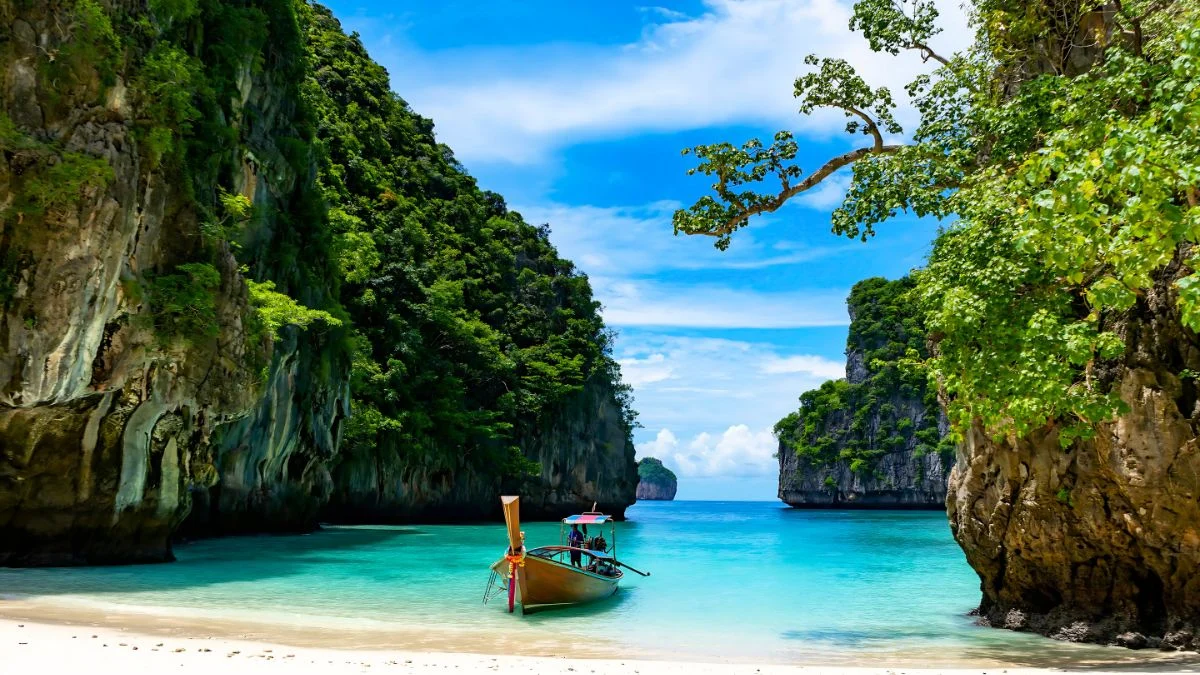
Why Visit? The Phi Phi Islands, famed for their crystal-clear waters and dramatic cliffs, are quieter in July. It’s a great time to explore this iconic destination in peace.
Highlights:
- Snorkeling in Maya Bay and Bamboo Island
- Viking Cave: Discover ancient wall paintings inside this historical cave.
Ao Nang Beach
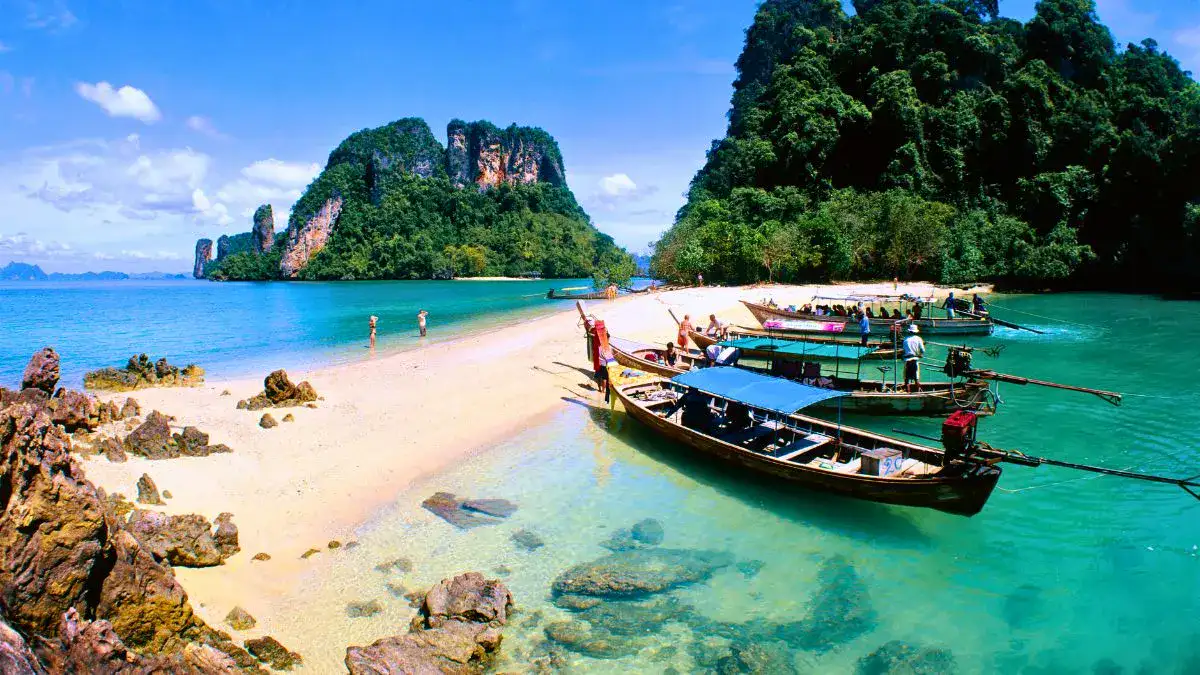
Why Visit? Ao Nang is a lively beach town that offers a mix of adventure and relaxation. It’s a great base for exploring nearby islands, with plenty of restaurants and local shops to enjoy.
Highlights:
- Long-tail Boat Rides: Enjoy the stunning coastal views and reach nearby islands.
- Beachfront Dining: Relax by the sea with delicious local cuisine.
Tiger Cave Temple (Wat Tham Sua)
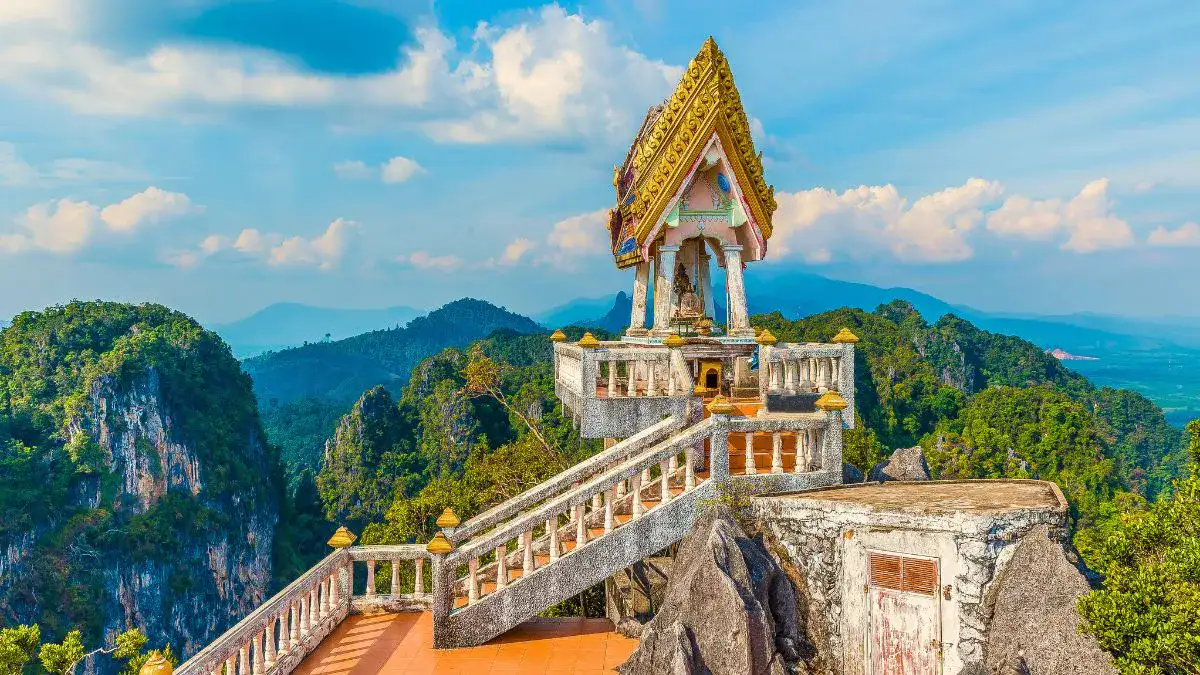
Why Visit? This spiritual and scenic temple offers breathtaking views of Krabi’s rainforest and limestone cliffs.
Highlights:
- Climb 1,260 steps for stunning panoramic views of the area.
- Tiger Paw-shaped Rock Formations: Explore these unique natural features.
Emerald Pool (Sa Morakot)
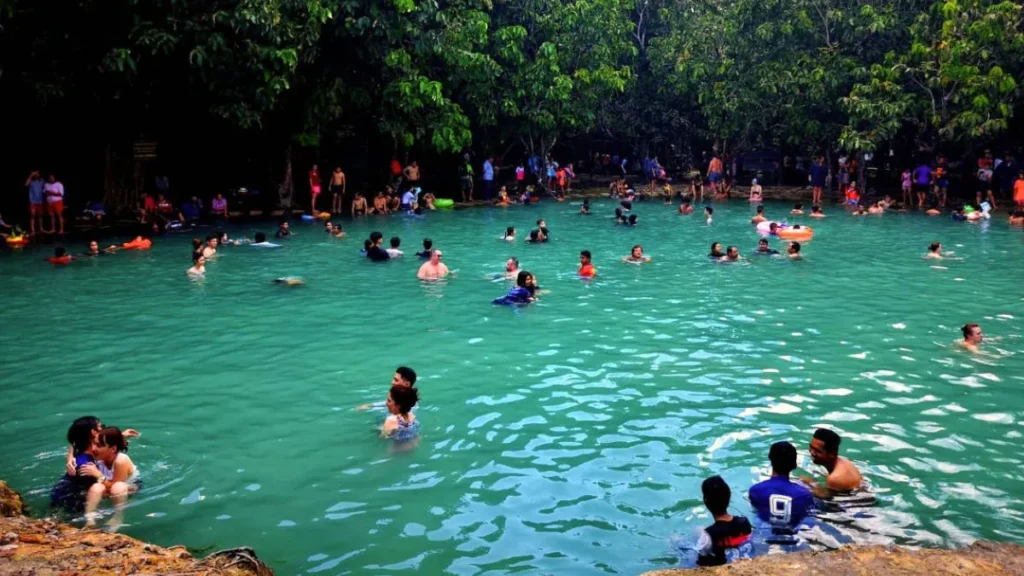
Why Visit? Located in the Khao Phra Bang Khram Nature Reserve, the Emerald Pool is a stunning natural hot spring surrounded by jungle.
Highlights:
- Swim in the mineral-rich waters of the Emerald Pool.
- Blue Pool: Though best seen in the dry season, the nearby Blue Pool is still a beautiful spot in July.
Four Islands Tour
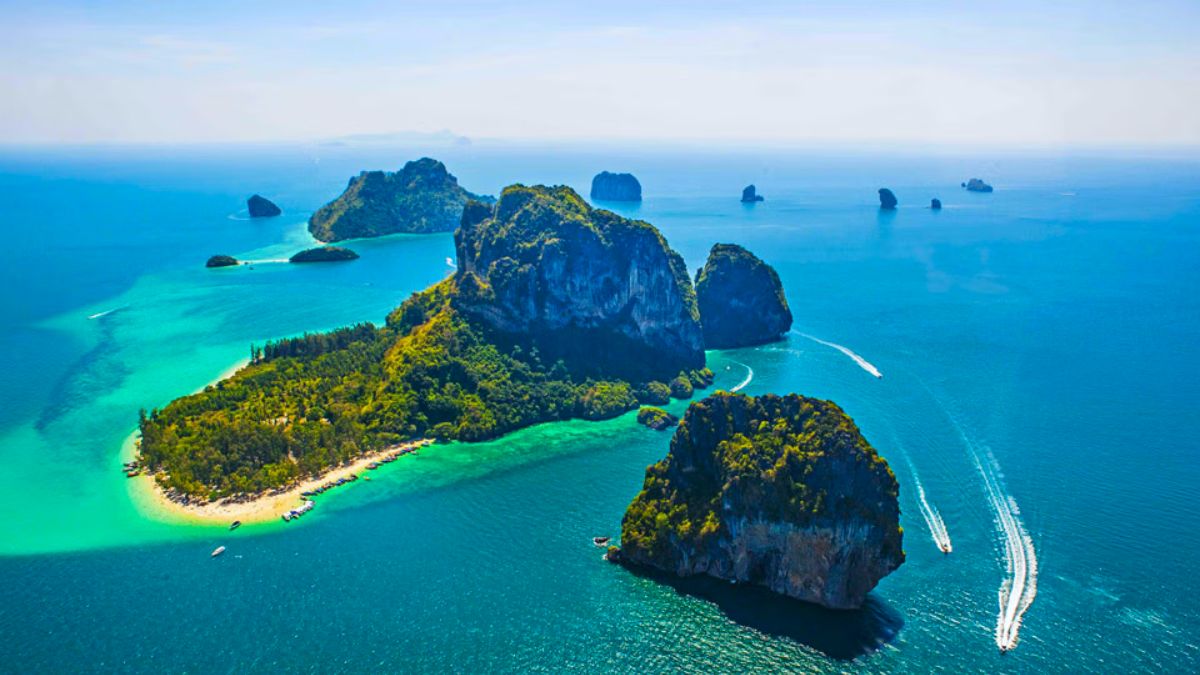
Why Visit? This popular tour takes you to four idyllic islands: Poda Island, Chicken Island, Tup Island, and Phra Nang Cave Beach.
Highlights:
- Snorkel and swim in the turquoise waters.
- Tup Island Sandbar: Witness this unique sandbar that appears during low tide.
Krabi Elephant Sanctuary
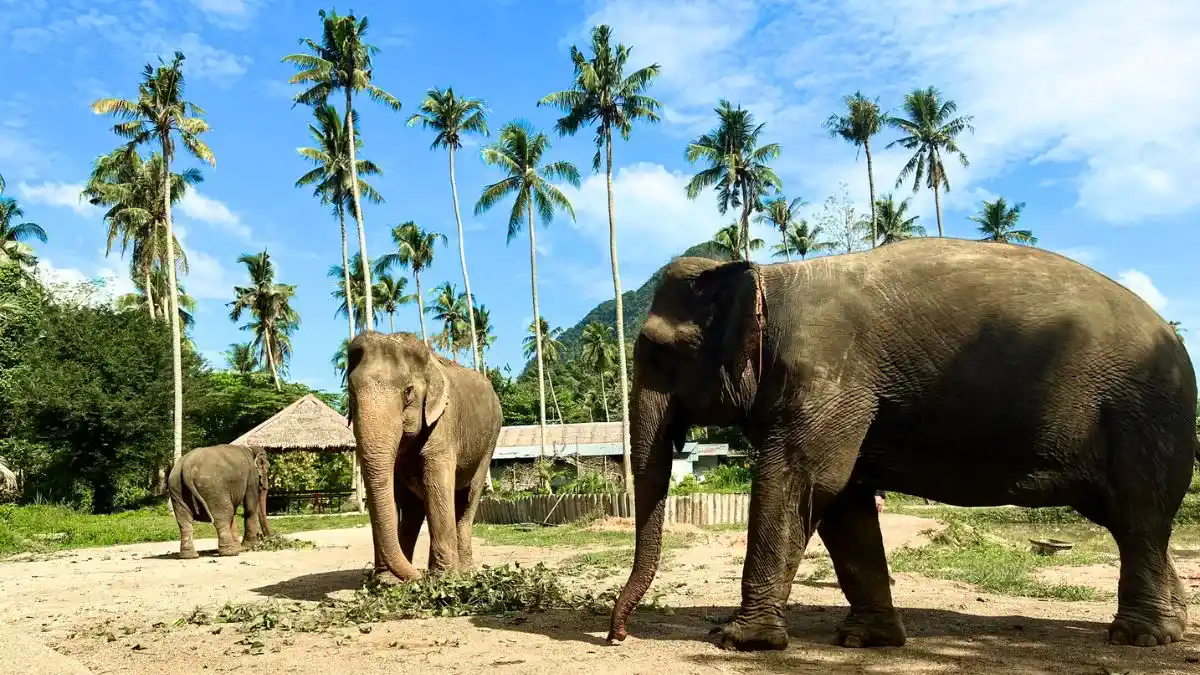
Why Visit? The sanctuary offers an ethical and sustainable way to interact with elephants. Learn about their conservation efforts while interacting with these magnificent animals.
Highlights:
- Feed and bathe elephants in a natural environment.
- Conservation Education: Discover the sanctuary’s conservation projects.
Top Activities in Krabi in July
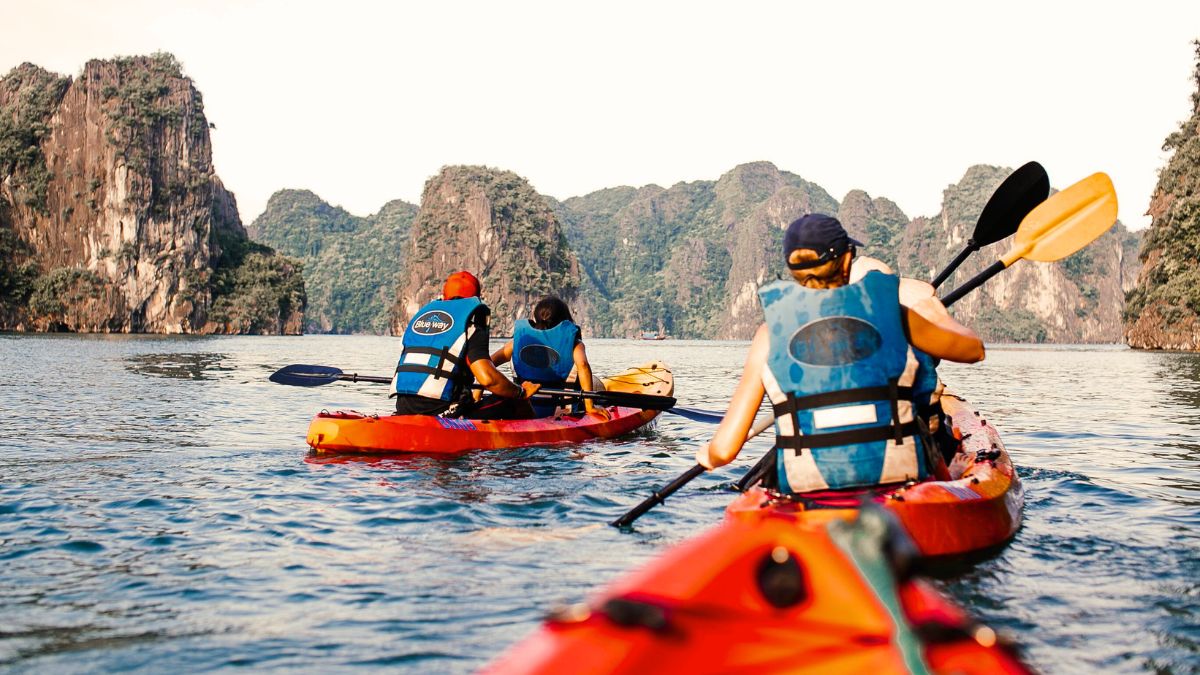
- Island Hopping: Explore nearby islands like the Phi Phi Islands, Hong Islands, and Bamboo Island by boat. Despite occasional showers, the stunning scenery and peaceful atmosphere make this a must-do activity. You can enjoy snorkeling, swimming, and exploring hidden beaches.
- Snorkeling and Scuba Diving: The waters around Krabi, including the Phi Phi Islands and Ao Nang, are great for snorkeling and scuba diving. The rain may not affect visibility much, and you’ll get to experience vibrant coral reefs, tropical fish, and other marine life.
- Kayaking: Paddle through the crystal-clear waters of Ao Thalane or the caves and lagoons of the Hong Islands. Kayaking through the mangroves or limestone formations offers a peaceful and scenic adventure, especially when it’s less crowded.
- Visit the Hot Springs: Soak in the natural Klong Thom Hot Springs in the jungle. The warm waters are perfect for relaxing, especially after a rainy day. The steam rising from the springs in the cooler weather adds a special touch to the experience.
- Rock Climbing at Railay Beach: Known as one of the best rock climbing destinations in the world, Railay Beach offers both beginner and advanced routes. The rainy season brings fewer climbers, meaning more opportunities to enjoy the cliffs without the crowds.
- Relax on Krabi’s Beaches: While it might rain at times, the beaches like Ao Nang, Phra Nang Cave Beach, and Nopparat Thara Beach offer a great place to relax and enjoy the natural surroundings. You can unwind, enjoy a swim, or take a walk along the shoreline.
- Sunset Views: While July brings rain, the clouds often clear up in the late afternoon, giving you stunning sunset views. Head to places like Ao Nang or Phra Nang Beach to enjoy the beautiful evening sky.
Festivals and Events in Krabi in July
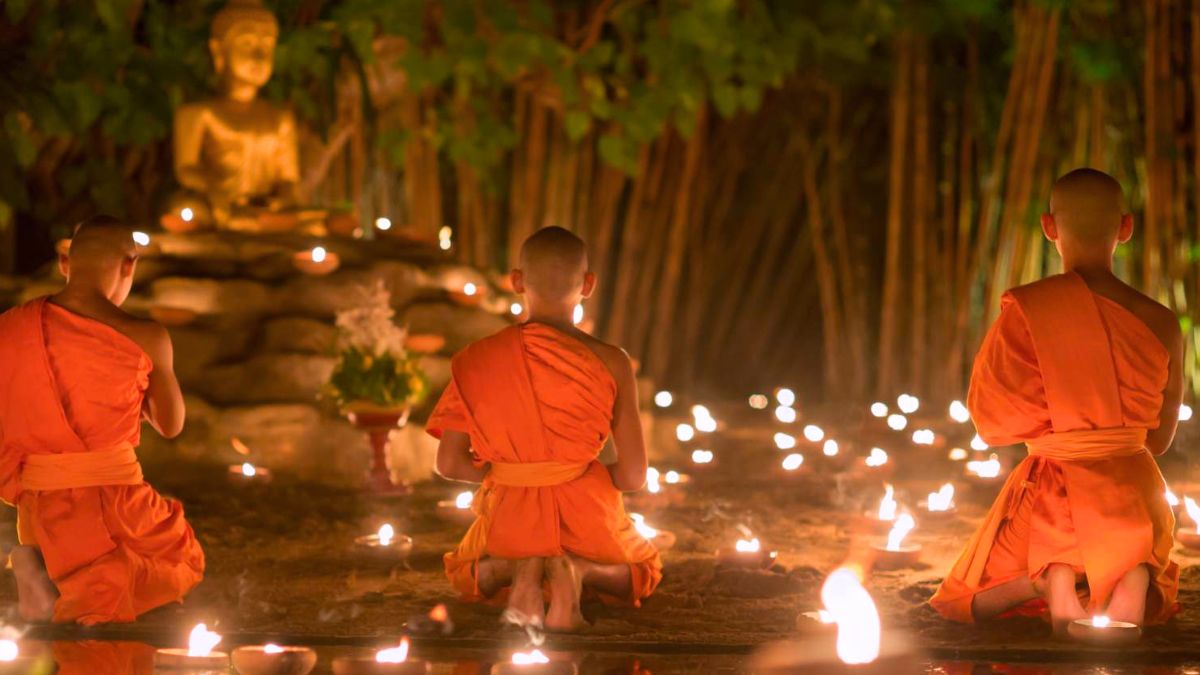
- Asanha Puja (Dharma Day)
- Date: Full Moon in July
Highlights: A significant Buddhist holiday celebrating the Buddha’s first sermon with ceremonies and offerings at temples across Thailand.
- Date: Full Moon in July
- Ubon Ratchathani Candle Festival
- Date: July, around Asanha Puja
Location: Ubon Ratchathani
Highlights: A grand celebration featuring wax candle displays, processions, and cultural performances in honor of Asanha Puja.
- Date: July, around Asanha Puja
- Buddhist Lent (Khao Phansa)
- Date: Starts after Asanha Puja
Highlights: The start of a three-month retreat for monks, marked by offerings to monks and temple ceremonies.
- Date: Starts after Asanha Puja
- King’s Birthday (King Vajiralongkorn’s Birthday)
- Date: July 28
Highlights: National celebrations with parades, ceremonies, and charity events to honor the King’s birthday.
- Date: July 28
These events provide a great way to experience Thailand’s culture, spirituality, and traditions in July.
Tips for Visiting Krabi in July
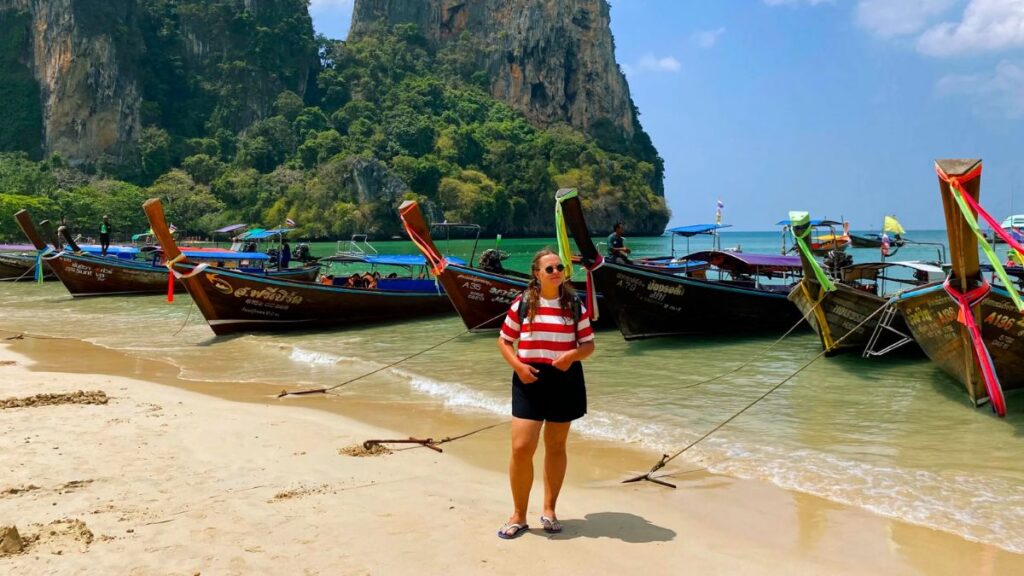
Krabi in July offers a peaceful and budget-friendly experience with fewer tourists and lush landscapes. Here are six tips to make the most of your visit:
- Pack for Rain
Be prepared for occasional showers with waterproof clothing, an umbrella, and water-resistant footwear. - Book Flexible Tours
Opt for tours that can adjust to changing weather conditions, ensuring the best experience. - Explore Less Crowded Beaches
With fewer tourists, enjoy peaceful visits to Railay Beach and Phi Phi Islands without the usual crowds. - Take Advantage of Lower Prices
Enjoy discounted hotels and affordable tours during the off-peak rainy season. - Visit Waterfalls and Hot Springs
The rain enhances natural attractions like the Khlong Thom Waterfall and Emerald Pool, perfect for a refreshing experience.
Conclusion
Krabi in July is a great choice for a peaceful and budget-friendly trip. The rain makes the landscapes greener and the waterfalls more beautiful. With fewer tourists, you can enjoy places like Railay Beach and Phi Phi Islands at your own pace. Affordable stays and delicious local food add to the experience, making Krabi in July a memorable destination.
Also Read: Krabi in September
Frequently Asked Questions
Is July a good time to visit Krabi?
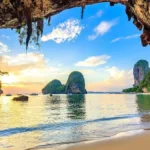
July is part of the rainy season in Krabi, which means you can expect occasional showers, especially in the afternoons. However, it’s still a good time for those who want to avoid crowds and enjoy lower prices. The rain is usually short-lived, and many activities can still be enjoyed.
What is the weather like in Krabi in July?

The weather in Krabi in July is warm with temperatures ranging from 25°C to 30°C (77°F to 86°F). It’s the rainy season, so expect frequent, heavy showers, though they typically last for a few hours and are followed by sunshine.
Can I still go island hopping in Krabi during July?
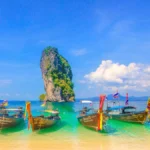
Yes, you can still enjoy island hopping in Krabi in July. The weather may be a bit unpredictable, but many boat tours operate year-round. The islands are quieter, so you can enjoy a more peaceful experience.
What are the best activities to do in Krabi in July?

The best activities include visiting Krabi’s temples, exploring natural parks like Ao Nang and Railay Beach, enjoying local seafood, and taking a boat tour to nearby islands like Phi Phi Islands or Hong Islands. It’s also a great time for Thai cooking classes and cultural experiences.
Is it safe to travel to Krabi in July?
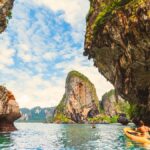
Yes, it is generally safe to travel to Krabi in July. While the rainy season can bring storms, they are usually short and not dangerous. Always check the weather forecast and follow safety guidelines when participating in water-based activities.

